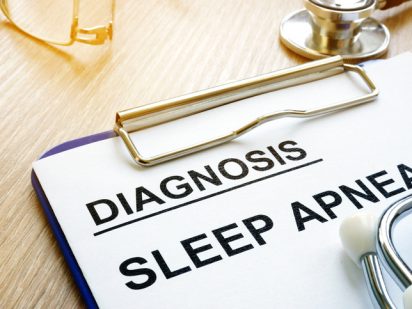Obstructive sleep apnea is a potentially serious sleep disorder. It causes breathing to repeatedly stop and start during sleep. There are several types of sleep apnea, but the most common is obstructive sleep apnea. This type of apnea occurs when your throat muscles intermittently relax and block your airway during sleep. A noticeable sign of obstructive sleep apnea is snoring.
Other signs and symptoms of obstructive sleep apnea can include:
- Excessive daytime sleepiness
- Loud snoring
- Observed episodes of stopped breathing during sleep
- Abrupt awakenings accompanied by gasping or choking
- Awakening with a dry mouth or sore throat
- Morning headache
- Difficulty concentrating during the day
- Experiencing mood changes, such as depression or irritability
- High blood pressure
- Nighttime sweating
- Decreased libido
According to the American Sleep Apnea Association, an estimated 22 million Americans suffer from sleep apnea, with 80 percent of the cases of moderate and severe obstructive sleep apnea going undiagnosed. If left untreated, the ASAA said on their website, it can lead to high blood pressure, chronic heart failure, atrial fibrillation (a-fib), stroke, and other cardiovascular problems. While obstructive sleep apnea can happen to anyone, including infants and children, it is more commonly seen in men over 40, especially those who are overweight or obese.
If you have any of the aforementioned signs or symptoms, speak with your primary care provider; they can then give a referral for a sleep study at the Trinity Health Sleep Center, located at Trinity Hospital – St. Joseph’s.
“After having a sleep study and discovering that you have been diagnosed with Obstructive sleep apnea, it certainly is a life adjustment,” said Brenda Hamilton, MSW, LCSW, director of KeyCare Medical.
Thankfully, treatments for obstructive sleep apnea are available. One treatment involves using a device that uses positive pressure to keep your airway open while you sleep. A Continuous Positive Airway Pressure (CPAP) machine, also known as a sleep apnea machine, provides a gentle and constant flow of prescribed pressurized air through a CPAP mask and hose to help keep your airway open while you sleep.
“Your machine will be dependent on your individual sleep therapy plan,” Hamilton said. “Your provider will prescribe the appropriate type of treatment for your condition.”
Once you have completed a sleep study, and it has been determined that you need a PAP device for a sleep disorder, KeyCare Medical will assist you from start to finish in this process of finding the right treatment. “Upon receiving a prescription from your provider, KeyCare Medical staff will make an appointment with you to come in and have instruction with our RT/Nursing staff,” she added.
KeyCare Medical’s team of Registered Respiratory Therapists and a Licensed Nurse can assist you in your treatment journey.
“It is our goal to help you be successful, leading to a positive outcome,” Hamilton said.
After providing a PAP device and determining a good mask for you, the therapy data is monitored through a computer application, post fitting. This aids in the staff assisting you through your transition so you can be successful in treating your sleep apnea.
“KeyCare Medical believes the success of treating different sleep disorders is fundamental to good patient care,” Hamilton said. “The staff is available to help with your needs. We carry a large selection of sleep apnea products; if they are not available in our store, often we are able to order what you require.”
The facility is located at 530 20th Ave SW, Minot. KeyCare Medical is open 8:30a.m. to 5:00 p.m., Monday through Friday. For appointments for your OSA/CPAP needs, call 701-857-7370 to schedule a visit.

